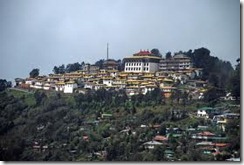New Delhi/Lahore: The government's efforts to boost onion supply suffered a setback with Pakistan banning exports of the commodity via Wagah border which pushed prices up by Rs 5-10 a kg, even as competition watchdog CCI ordered a probe into possible cartels among traders.

Retail prices of onion jumped up by Rs 5-10 per kg to up to Rs 65 in metros due to lower supplies from Pakistan.
As 300 India-bound trucks carrying 3,000 tonnes of onion had reached the Wagah border near Amritsar, Pakistan's commerce ministry imposed a ban on movement through land route, giving a shock to India.
Onion prices increased to Rs 60-65 a kg in major metros such as Delhi, Chennai and Mumbai. "Retailers have jacked up prices on reports of ban by Pakistan," General Secretary of Tomato and Onion Merchants' Association in Delhi's Azadpur Mandi said.
New Delhi dubbed the Pakistan's decision as "shocking", with commerce and industry minister Anand Sharma stating the issue has been taken up with the concerned authorities in Islamabad.
Pak's undiplomatic onion
"It is shocking and unfortunate that Pakistan has banned onion exports to India via land route...The matter has been discussed with the High Commissioner in Islamabad, who has already met the concerned officials there," Sharma said.
He said Pakistan has been asked to reconsider its decision or at least release the trucks carrying contracted quantity of the commodity.
As Sharma reviewed the situation with heads of government importing agencies STC and PEC, top secretaries of the ministries of agriculture, commerce and finance went into a huddle with cabinet secretary K M Chandrasekhar to find alternative supplies.

"I have concluded a contract with Pakistan via sea route. Onion will arrive at Mundra port(in Gujarat)," Commerce secretary Rahul Khullar said after meeting of the Committee of Secretaries.
The government of Punjab, Pakistan's most populous province, stopped onion exports to India this morning. The ban on exports has been imposed to control prices within Pakistan, a government spokesman said in Lahore. Meanwhile, the Competition Commission ordered a probe into the possible cartelisation by traders.
"The commission has held many deliberations to study the possibility of cartelisation by onion traders and prima facie there appears to be a case. So, we have taken a suo moto action in carrying out the probe," an official said. The Director General (Investigations) of the CCI will submit the report on probe within 45 days.
Pakistan bans onion export via land route
Pakistan has imposed a complete ban on the export of onion to India via Wagah-Attari land route, a development which may hit Centre's efforts in rein in skyrocketing prices of bulb in the country.
"Pakistan government has banned the supply of onion to India via land route," Customs Department (Amritsar) Deputy Commissioner R K Duggal said today, while adding that today no truck was allowed to bring onion by Pakistan authorities following the ban.

Local traders attributed the imposition of ban on export of onion by Pakistan government to prevent any spiralling hike in bulb prices in the neighbouring country.
Sudden ban imposed on export of onion has hit the traders of both the countries with Indian importers claiming that Pakistan had not even allowed the supply of almost 1,500 tonnes of contracted orders of onion.
"Almost 1,500 tonne of onion was yet to be supplied to us but Pakistan government has not allowed the local suppliers to fulfil their trade obligation," rued Anil Mehra, Amritsar-based vegetable merchant.
According to custom officials, between 100-150 trucks laden with onion were not allowed to enter Indian territory at Amritsar by Pakistan authorities on Wednesday and asked to return.
"When custom authorities (of Pakistan) have already given clearance to contracted supply of onion heading for India then why they (Pakistan) have stopped the supply," asked Mehra, whose 250 tonnes of onion imported from Pakistan got stuck following the implementation of ban.

Though Indian custom authorities claim that onion supply from Pakistan was allowed through rail route yet importers argued that Pakistan had banned onion export except sea route.
"Pakistan order clearly says no supply of onion will take place except sea route," traders asserted claiming that vegetable suppliers in Pakistan were agitating against imposition of ban on onion export.
Notably, close to 7,000 tonnes of onion had arrived since the commencement of onion export to India from Pakistan via land route. Because of the supply of Pakistan onion, prices of onion in Punjab and Chandigarh had come down from a level of Rs 60-65 per kg to Rs 45-50 per kg.
Even the Centre had abolished the custom duty on import of onion in order to rein in spiralling rates of bulb.
India and Pakistan had agreed to start cross border movement of trucks in the month of October 2007 after a gap of sixty years from Attari Check post at Amritsar in India to Wagah border in Pakistan with an intention of boosting bilateral trade.
Source: Agencies
 A two-day cultural event was recently organized in a small hamlet in Manipur to promote the 'Tangkhul culture' among the youth, who are losing contact with their roots at a very high pace.
A two-day cultural event was recently organized in a small hamlet in Manipur to promote the 'Tangkhul culture' among the youth, who are losing contact with their roots at a very high pace.
























